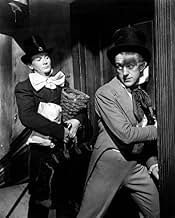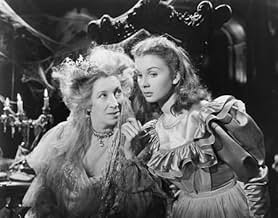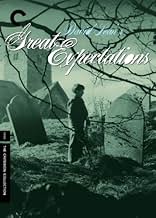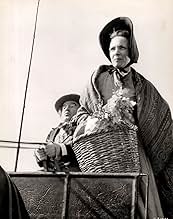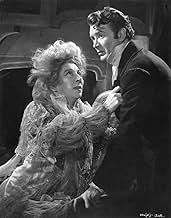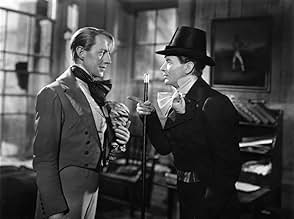A humble orphan boy in 1810s Kent is given the opportunity to go to London and become a gentleman - with the help of an unknown benefactor.A humble orphan boy in 1810s Kent is given the opportunity to go to London and become a gentleman - with the help of an unknown benefactor.A humble orphan boy in 1810s Kent is given the opportunity to go to London and become a gentleman - with the help of an unknown benefactor.
- Won 2 Oscars
- 11 wins & 4 nominations total
Tony Wager
- Young Pip
- (as Anthony Wager)
O.B. Clarence
- The Aged Parent
- (as O. B. Clarence)
Featured reviews
This adaptation of Charles Dickens's classic novel, directed by David Lean from a script he co-adapted, and photographed by Guy Green, is a miracle of invention, economy and detail. Every piece on every set; every line of dialogue; every gesture and line reading of every actor; every black-and-white frame of this beautiful film seems perfect. Dickens's characters, situations and themes are all vividly dramatized. Pip, Pocket, Joe, Mr. Jaggers, Magwitch andunforgettablyMiss Havisham, are all here and all ready to move, amuse, frighten and entertain anyone willing to spend time with them.
I haven't read the book since I was thirteen. I vividly remember Miss Havisham, but I don't remember noting the contrast between her and Magwitch, the ex-convict. She becomes bitter and vengeful after a great heartbreak; he becomes great of heart through one small act of kindness. That's what made the movie for me this time; but clearly there's richness to spare for future viewings.
There is so much here not only for Dickens fans, but for anyone who loves movies. I especially liked that shot from Pip's point of view as he becomes sick. It's the kind of crazy effect beloved of filmmakers, too; but I love it not so much for itself, but for being the right shot at the right moment. Some directors hide, others show off, but directors like David Lean know how to do both and know when to do which.
I haven't read the book since I was thirteen. I vividly remember Miss Havisham, but I don't remember noting the contrast between her and Magwitch, the ex-convict. She becomes bitter and vengeful after a great heartbreak; he becomes great of heart through one small act of kindness. That's what made the movie for me this time; but clearly there's richness to spare for future viewings.
There is so much here not only for Dickens fans, but for anyone who loves movies. I especially liked that shot from Pip's point of view as he becomes sick. It's the kind of crazy effect beloved of filmmakers, too; but I love it not so much for itself, but for being the right shot at the right moment. Some directors hide, others show off, but directors like David Lean know how to do both and know when to do which.
The Dickens novel is given classic treatment in David Lean's "Great Expectations". The opening scene is so atmospheric it sets the tone for the convoluted story to follow. The earlier scenes with young Pip are the most enjoyable for me--especially those involving Estella (Jean Simmons) and Miss Havisham (Martita Hunt).
Brilliant performances from all concerned. John Mills is wholly satisfying as the adult Pip and Valerie Hobson as the adult Estella--but it is Martita Hunt's Miss Havisham, sitting among the ruined finery of a wedding that never took place, everything exactly the way it was on that fateful day--and waging war on men ever since--that lingers in the memory.
Some of the best black and white photography seen until that time and an absorbing story with twists and surprises that have logical explanations. Compares favorably with the other great British film, "Oliver Twist" and, by all means, recommended viewing.
Not only worthy of its Best Picture nomination, it should have won over "Gentleman's Agreement" which now seems preachy and artificial.
Brilliant performances from all concerned. John Mills is wholly satisfying as the adult Pip and Valerie Hobson as the adult Estella--but it is Martita Hunt's Miss Havisham, sitting among the ruined finery of a wedding that never took place, everything exactly the way it was on that fateful day--and waging war on men ever since--that lingers in the memory.
Some of the best black and white photography seen until that time and an absorbing story with twists and surprises that have logical explanations. Compares favorably with the other great British film, "Oliver Twist" and, by all means, recommended viewing.
Not only worthy of its Best Picture nomination, it should have won over "Gentleman's Agreement" which now seems preachy and artificial.
10ellkew
The term 'classic' is often banded about with regard to films but I feel this one does warrant the term. A masterpiece of film-making by one of the best director's to take the chair. From the opening on the flat marshland framed by the hangman's gantry, this is wonderfully atmospheric storytelling of the highest quality which manages to capture the feel of the novel. The inspired touches with the cows muttering to Pip when he takes the stolen food to the convict and the howling wind over London as Pip's past is about to knock on his door, stay in the mind. This film is rich in character and detail. A sumptuous film that is a real treat. I can still, even today, taste the pork pie that Pip steals from the larder and feel his fear as Joe's wife goes to look for it and the sadness as the older Pip is embarrassed by Joe in his upmarket London surroundings and watches his old friend leave London from his living room window. An absolute masterpiece of cinema.
As I watched the beginning of this film, I couldn't help but compare the story to the only other Charles Dickens story I was familiar with: Oliver Twist. It looked like it was going to be another story of a nice, respectful boy being abused by nasty adults. However, as soon as the young boy turned into a man, the similarities ended. Poor Oliver had a lot of ups and downs but life was basically pretty good for the boy, "Pip" in "Great Expectations."
Because of that, I didn't think this Dickens tale had the emotional impact of Oliver Twist, but still was great storytelling. The last 20-30 minutes of this film tied so many things together it really made it a satisfying film. From what I just researched, it sounds like the book was a lot harsher story.
My only major complaint with this film is the casting of the lead character, "Pip," as an adult, which involves most of this movie. John Mills looked way too old to be playing a 20-year-old "Pip Pirrip." In truth, he was too old. Mills was 38 when doing this role. They couldn't have found a younger actor? This guy looked and sounded like Ronald Colman, which is fine except Colman never looked 20, either! This is gross miscasting.
At any rate, I enjoyed a number of actors in here, mainly three older ones: Martita Hunt, Findlay Currie and Francis L. Sullivan. Hunt was just great as "Miss Haversham." I found her fascinating in every sentence she delivered, all of which she did while just sitting in a chair. Currie was genuinely frightening in the beginning as the escaped convict "Magwitch." However, what a transformation that man made in this story! Francis L. Sullivan emotes convincingly enough to play the
lawyer "Mr. Jaggers" and be fun to view, too. The rest of the actors were fine, but nothing memorable.
To me, the acting took a back seat to Dickens' story and to the film's cinematography. Knowing David Lean directed this film, that Criterion usually produces nice-looking DVD transfers and that "Oliver Twist" looked fantastic on disc, I was paying as close attention to the cinematography, and I enjoyed it. The story wasn't that intense until the finale, which was very well done. The romance was a bit questionable and is a sad-but-true comment how many people, at least us men, can be "in love" with a shallow woman who offers nothing but good looks. (Speaking of looks, Valerie Hobson pretending to be a little older Jean Simmons in the role of "Estella' is like Margaret Hamilton passing for slightly-older Jennifer Jones. Give me a break!)
Even though the screenplay is softer than the novel, most people say it still captures Dickens' flavor, and few critics had anything but praise for this classic film. Do I prefer this movie over the aforementioned Oliver Twist? No, but only because the latter is the most stunning photographed black-and-white movie I've ever watched. ("Citizen Kane" ranking second.) This is still very good in that category. Lean and cinematographer Guy Green won Oscars for their work here, so you know it's not too shabby.
The combination of Dickens, Lean, Green and a fine cast all make this a classic movie that is certainly recommended. Don't make the mistake of choosing the insipid 1998 version with Ethan Hawke and Gywneth Paltrow. This is the only version you want to see.
Because of that, I didn't think this Dickens tale had the emotional impact of Oliver Twist, but still was great storytelling. The last 20-30 minutes of this film tied so many things together it really made it a satisfying film. From what I just researched, it sounds like the book was a lot harsher story.
My only major complaint with this film is the casting of the lead character, "Pip," as an adult, which involves most of this movie. John Mills looked way too old to be playing a 20-year-old "Pip Pirrip." In truth, he was too old. Mills was 38 when doing this role. They couldn't have found a younger actor? This guy looked and sounded like Ronald Colman, which is fine except Colman never looked 20, either! This is gross miscasting.
At any rate, I enjoyed a number of actors in here, mainly three older ones: Martita Hunt, Findlay Currie and Francis L. Sullivan. Hunt was just great as "Miss Haversham." I found her fascinating in every sentence she delivered, all of which she did while just sitting in a chair. Currie was genuinely frightening in the beginning as the escaped convict "Magwitch." However, what a transformation that man made in this story! Francis L. Sullivan emotes convincingly enough to play the
lawyer "Mr. Jaggers" and be fun to view, too. The rest of the actors were fine, but nothing memorable.
To me, the acting took a back seat to Dickens' story and to the film's cinematography. Knowing David Lean directed this film, that Criterion usually produces nice-looking DVD transfers and that "Oliver Twist" looked fantastic on disc, I was paying as close attention to the cinematography, and I enjoyed it. The story wasn't that intense until the finale, which was very well done. The romance was a bit questionable and is a sad-but-true comment how many people, at least us men, can be "in love" with a shallow woman who offers nothing but good looks. (Speaking of looks, Valerie Hobson pretending to be a little older Jean Simmons in the role of "Estella' is like Margaret Hamilton passing for slightly-older Jennifer Jones. Give me a break!)
Even though the screenplay is softer than the novel, most people say it still captures Dickens' flavor, and few critics had anything but praise for this classic film. Do I prefer this movie over the aforementioned Oliver Twist? No, but only because the latter is the most stunning photographed black-and-white movie I've ever watched. ("Citizen Kane" ranking second.) This is still very good in that category. Lean and cinematographer Guy Green won Oscars for their work here, so you know it's not too shabby.
The combination of Dickens, Lean, Green and a fine cast all make this a classic movie that is certainly recommended. Don't make the mistake of choosing the insipid 1998 version with Ethan Hawke and Gywneth Paltrow. This is the only version you want to see.
Charles Dickens certainly liked to write his novels from a child's point of view. Oliver Twist, David Copperfield, and Great Expectations all start with the hero/protagonist as a child. Only young Oliver Twist of the three I mentioned ended still a child in the novel's conclusion. In Oliver Twist, young Oliver is reunited with his propertied and somewhat wealthy grandfather looking to rise in station from his humble background.
Young Pip, short for Philip Pirrup, is also of humble background in Great Expectations. His parents are killed when he's young, he lives with his sister and her husband who is a blacksmith. During his childhood he befriends a convict on the run. Later on for mysterious reasons to him, he comes under the protection of eccentric old Miss Haversham who wants him as a companion for her adopted child Estella.
Later on as an adult, he has a mysterious benefactor who provides him income enough to live as a gentlemen, something he fervently desired all his life. It seems to be a dream come true. But there are still quite a few bumps on Pip's road of life.
Charles Dickens despaired of the poverty he saw in early Victorian Great Britain. But he also knew that riches alone did not necessarily guarantee happiness. It didn't for Scrooge, for Ms. Havisham, and certainly not for John Mills as the adult Pip. Nor does it for Valerie Hobson who inherits Ms. Havisham's estate.
Mills and Hobson are a perfectly cast pair of leads in this version of Great Expectations. Alec Guinness began a long association with director David Lean as Herbert Pocket, Pip's friend and roommate.
Finlay Currie, the craggy Scot's player who usually played kindly old gentlemen, turns out to be kinder indeed than originally presented as convict Abel Magwitch. It's a different kind of part for him.
Martita Hunt as Ms. Havisham plays a part all to familiar to me. I had an elderly relative in my family a lot like her, bitter at the world and taking it out on all around her.
My favorite in the film though is Francis L. Sullivan. Usually Sullivan's characters are crooked and/or corrupt in most of his films. As attorney Jaggers who seems to have an unseen hand in all the proceedings he actually is working for the ultimate benefit of both of our leads.
In Dickens's world, wealth can corrupt as easily as poverty. It's the character inside you that counts and that fact is not better demonstrated than in this adaption of Great Expectations.
Young Pip, short for Philip Pirrup, is also of humble background in Great Expectations. His parents are killed when he's young, he lives with his sister and her husband who is a blacksmith. During his childhood he befriends a convict on the run. Later on for mysterious reasons to him, he comes under the protection of eccentric old Miss Haversham who wants him as a companion for her adopted child Estella.
Later on as an adult, he has a mysterious benefactor who provides him income enough to live as a gentlemen, something he fervently desired all his life. It seems to be a dream come true. But there are still quite a few bumps on Pip's road of life.
Charles Dickens despaired of the poverty he saw in early Victorian Great Britain. But he also knew that riches alone did not necessarily guarantee happiness. It didn't for Scrooge, for Ms. Havisham, and certainly not for John Mills as the adult Pip. Nor does it for Valerie Hobson who inherits Ms. Havisham's estate.
Mills and Hobson are a perfectly cast pair of leads in this version of Great Expectations. Alec Guinness began a long association with director David Lean as Herbert Pocket, Pip's friend and roommate.
Finlay Currie, the craggy Scot's player who usually played kindly old gentlemen, turns out to be kinder indeed than originally presented as convict Abel Magwitch. It's a different kind of part for him.
Martita Hunt as Ms. Havisham plays a part all to familiar to me. I had an elderly relative in my family a lot like her, bitter at the world and taking it out on all around her.
My favorite in the film though is Francis L. Sullivan. Usually Sullivan's characters are crooked and/or corrupt in most of his films. As attorney Jaggers who seems to have an unseen hand in all the proceedings he actually is working for the ultimate benefit of both of our leads.
In Dickens's world, wealth can corrupt as easily as poverty. It's the character inside you that counts and that fact is not better demonstrated than in this adaption of Great Expectations.
Did you know
- TriviaSir Alec Guinness admired the way Sir David Lean directed him, singling out a close-up in which he had to laugh out loud, and which he struggled to make look unmanufactured. Lean told him to forget about the whole thing, sat by his side, and made a little signal to the camera to start turning in the course of the conversation. He said something which made Guinness laugh and then said, "Cut." Guinness: "So he got this shot on a totally false premise, but thank God. I don't think I would have ever achieved it otherwise."
- GoofsAt the end, when Pip is persuading Estella to leave Satis House with him, a 'Chad' is clearly visible drawn on the screen behind him (Chads were a popular form of graffiti in the 1940s - a character with a big nose looking over a wall). Chad is a British term; the American equivalent would be Kilroy, as in 'Kilroy was here'.
- Crazy creditsThe identity of the actress playing Molly is never revealed, because this would constitute a spoiler.
- Alternate versionsIn some prints, after the fifteen minute "convict episode" at the beginning of the film ends, a voice-over by the adult Pip (John Mills) says, "it was a year later", as Mrs. Joe arrives home in the carriage. As now usually shown, there is no voice-over in this sequence.
- ConnectionsFeatured in Moscow in Madrid (1965)
Details
- Release date
- Country of origin
- Official site
- Language
- Also known as
- Grandes esperanzas
- Filming locations
- St Mary's Marshes, Kent, England, UK(opening sequence - Pip and Herbert Pocket ride in rowboat)
- Production company
- See more company credits at IMDbPro
Box office
- Budget
- £350,000 (estimated)
- Gross worldwide
- $33,408
- Runtime
- 1h 58m(118 min)
- Color
- Aspect ratio
- 1.37 : 1
Contribute to this page
Suggest an edit or add missing content


